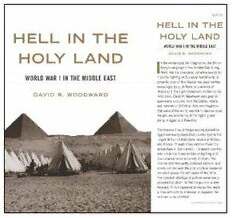
Hell in the Holy Land: World War 1 in the Middle East PDF
278 Pages·2006·1.822 MB·English
Most books are stored in the elastic cloud where traffic is expensive. For this reason, we have a limit on daily download.
Preview Hell in the Holy Land: World War 1 in the Middle East
Description:
In the modern popular imagination, the British Army's campaign in the Middle East during World War I is considered somehow less brutal than the fighting on European battlefields. A romantic view of this conflict has been further encouraged by such films as Lawrence of Arabia and The Light Horsemen. In Hell in the Holy Land, David R. Woodward uses graphic eyewitness accounts from the diaries, letters, and memoirs of British soldiers who fought in that war to describe in rigorous detail the genuine experience of the fighting and dying in Egypt and Palestine. The massive flow of troops and equipment to Egypt eventually made that country host to the largest British military base outside of Britain and France. Though many soldiers found the atmosphere in Cairo exotic, the desert countryside made the fundamentals of fighting and troop maintenance extremely difficult. The intense heat frequently sickened soldiers, and unruly camels were the only practical means of transport across the soft sands of the Sinai. The constant shortage of potable water was a persistent problem for the troops; one soldier recalled, "It is impossible to realize the depth a man will sink to endeavor to appease the terrible horror of thirst." The voices of these British soldiers offer a forgotten perspective of the Great War, describing not only the physical and psychological toll of combat but the daily struggles of soldiers who were stationed in an unfamiliar environment that often proved just as antagonistic as the enemy. A soldier of the Dorset Yeomanry, stationed in Egypt, wrote: "There are three sounds in Egypt which never cease -- the creaking of the waterwheels, the song of the frogs, and the buzz of flies.... Letter writing is an impossibility in the evening, for as soon as the sun goes down, if a lamp is lighted, the air all round is thick with little grey sand-flies which bite disgustingly." Using archival records, many from the Imperial War Museum in London, England, Woodward paints a vivid picture of the mayhem, terror, boredom, filth, and sacrifice that marked the daily life of British soldiers in the Middle East. In telling the story of these soldiers, Woodward provides a personal history of a campaign that laid the groundwork for the continuing turmoil in the Middle East.
See more
The list of books you might like
Most books are stored in the elastic cloud where traffic is expensive. For this reason, we have a limit on daily download.
